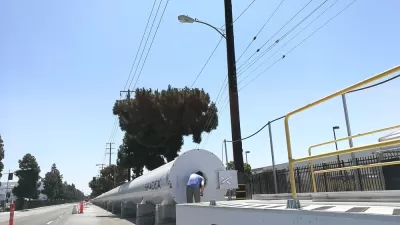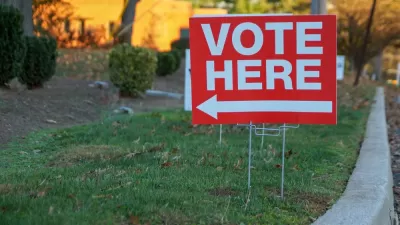About that Hyperloop report…

Aaron Gordon spoke to a number of transit and transportation experts and produces scathing criticism of the recent Great Lakes Hyperloop feasibility study released earlier this week.
The study, published by the Northeast Ohio Areawide Coordinating Agency and Hyperloop Transportation Technologies, estimated the price of the project at $29.8 billion and called for more studies of the project. Studies will be necessary, according to Gordon, because Hyperloop technology is totally unproven.
As such, a Hyperloop feasibility study is a strange document, somewhat like studying the conservation of the unicorn population after a few people strapped a horn onto a horse. As of this writing, Hyperloops have not transported any humans. The maximum speed a test pod has reached is 288 mph, well short of the advertised maximum velocity of 650 mph, or 700, or even 750 (the number varies article by article, not exactly a reassuring testament to the precision of their estimates).
The argument in favor of the Hyperloop doesn't just stop at travel speeds. The feasibility report also touts lofty economic development and job creation figures. There's a very large problem with those estimates, according to Gordon.
That all sounds real good except it’s also totally unclear how they arrived at these numbers. Despite the study’s 156-page length, it is extremely light on methodology or the assumptions baked into the calculations. In fact, any mention of study methodology or assumptions directs inquiring minds to an appendix. However, the feasibility study does not have an appendix, nor does the study’s landing page on NOACA’s website.
Gordon speaks to a number of experts who also noticed those discrepancies in the report, and they all express unequivocal caution at the idea that Hyperloop could possibly live up to the initial billing sold in the feasibility report.
Looming behind all of this Hyperloop discussion, are pressing needs on infrastructure and economic development investment that are already proven, and could provide tremendous benefit to the regions exploring the Hyperloop (the Great Lakes Hyperloop isn't the only one).
FULL STORY: Hyperloop Is The Midwest's Answer To A Question No One Asked

Planetizen Federal Action Tracker
A weekly monitor of how Trump’s orders and actions are impacting planners and planning in America.

Restaurant Patios Were a Pandemic Win — Why Were They so Hard to Keep?
Social distancing requirements and changes in travel patterns prompted cities to pilot new uses for street and sidewalk space. Then it got complicated.

Map: Where Senate Republicans Want to Sell Your Public Lands
For public land advocates, the Senate Republicans’ proposal to sell millions of acres of public land in the West is “the biggest fight of their careers.”

Maui's Vacation Rental Debate Turns Ugly
Verbal attacks, misinformation campaigns and fistfights plague a high-stakes debate to convert thousands of vacation rentals into long-term housing.

San Francisco Suspends Traffic Calming Amidst Record Deaths
Citing “a challenging fiscal landscape,” the city will cease the program on the heels of 42 traffic deaths, including 24 pedestrians.

California Homeless Arrests, Citations Spike After Ruling
An investigation reveals that anti-homeless actions increased up to 500% after Grants Pass v. Johnson — even in cities claiming no policy change.
Urban Design for Planners 1: Software Tools
This six-course series explores essential urban design concepts using open source software and equips planners with the tools they need to participate fully in the urban design process.
Planning for Universal Design
Learn the tools for implementing Universal Design in planning regulations.
Heyer Gruel & Associates PA
JM Goldson LLC
Custer County Colorado
City of Camden Redevelopment Agency
City of Astoria
Transportation Research & Education Center (TREC) at Portland State University
Camden Redevelopment Agency
City of Claremont
Municipality of Princeton (NJ)




























